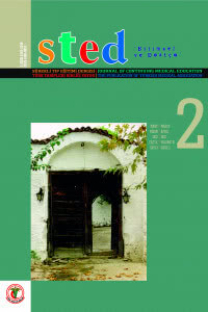İzmir İli Bornova ilçesi lise son sınıf öğrencilerinde üniversiteye giriş sınavı kaygısı
Öğrencilerin sınavlara karşı gösterdikleri duygusal reaksiyon olarak tanımlanan sınav kaygısı öğrenci başarısı üzerine etkili bir etmendir ve öğrenciler arasında %30 sıklıkla gözlenmektedir. Sınav kaygısı öğrencilerde hipertansiyon, bulantı, koroner arter hastalığı ve bağışıklık mekanizmasının zayıflaması ile birlikte giden olumsuz etkilerle birlikte seyretmektedir. Sınav kaygısı ile baş etmede gevşeme teknikleri, sistemik duyarsızlaştırma ve bilişsel temelli girişimler gibi çok faktörlü tedavi yaklaşımlarından yararlanılmaktadır. Amaç: Araştırmada Bornova'da seçilmiş liselerde son sınıf öğrencilerinin eğitim dönemi başında ve sonundaki sınav kaygılarının saptanması amaçlanmıştır. Gereç ve Yöntem: Bornova İlçesi'ndeki rasgele yöntemle seçilmiş liselerdeki 430 öğrenciye ulaşılması hedeflenmiştir. Öğrencilerin sınav kaygı düzeyini saptamak amacıyla 50 başlıklı Sınav Kaygı Ölçeği kullanılmıştır. Ölçek hem eğitim dönemi başında hem de sonunda her bir öğrenciye uygulanmış ve yedi temel başlıkta kaygı düzeyleri hesaplanmıştır. Bulgular: Eğitim dönemi başında (Ekim ayında) hedeflenen öğrencilerin %91.6'sına, dönem sonunda (Nisan ayında) ise ancak %43.9'üne ulaşılmıştır. Kızların daha kaygılı olduğu, genel kaygı düzeyleri bakımından liseler arasında anlamlı bir farklılığın olduğu, düzenli çalışmayan öğrencilerin daha kaygılı oldukları saptanmıştır. Öğrencilerin %71.7'si sınav kaygısını azaltmak için bir ya da birden fazla yöntem uyguladıklarını ifade etmiştir. Sonuç: Kaygı puanlarındaki yükseklik, başta üniversite sınavı olmak üzere sınavlara ilişkin kaygıların çok önceden başladığını göstermektedir. Okullarda sınav kaygısını azaltmaya yönelik rehberlik hizmetlerine gereksinim vardır. Bu hizmetlerin sürekliliği önemlidir.
Anahtar Kelimeler:
Öğrenciler, Test kaygı ölçeği, Kaygı, Sınav soruları, Psikolojik testler
University entrance exam anxiety of senior high school students in the province of İzmir, district of Bornova
Introduction: Exam anxiety, defined as the emotional reaction of students towards examinations, is a factor which affects the success of the student; and it is observed in 30% of students. In students, exam anxiety is associated with the negative effects seen with hypertension, nausea, coronary artery disease and the disturbance of immune mechanisms. Multi-component treatment approaches consisting of relaxation training, systematic desensitization and cognitivebased interventions are utilized to treat exam anxiety. Aim: The aim of this study is to assess the university entrance exam anxiety of senior high school students in Bornova at the beginning and end of the academic year. Materials and Method: It was aimed to reach 430 students in randomly selected high schools in Bornova. To assess the exam anxiety level of the students, the "Exam Anxiety Inventory" was used, which consisted of 50 headings. The inventory was applied both at the beginning and at the end of the academic year and anxiety levels were calculated on the basis of seven basic headings. Results: Response rate was 91.6% at the beginning (October) and 43.9% at the end (April) of the academic year. It was determined that girls had more anxiety, there were significant differences among high schools in terms of general anxiety levels, and that students who did not study regularly had higher levels of anxiety. 71.7% of all students stated that they used one or more coping strategies to reduce exam anxiety. Conclusion: The high level of anxiety scores show that anxiety regarding exams, especially the university entrance exam, appear long before the date of the examination. Counseling services for reducing exam anxiety are required in schools. It is important that these services be continual.
Keywords:
Students, Test Anxiety Scale, Anxiety, Examination Questions, Psychological Tests,
___
- Hancock D.R. Effects of Test Anxiety and Evaluative Threat on Students' Achievement and Motivation. The Journal of Educational Research. 2001; 94: 284- 290
- Dönmezer İ. Eğitim Psikolojisi (Gelişim ve Öğrenme). EÜ. Basımevi; 2000.
- Kennedy D.Y Doepke KJ. Multicomponent Treatment of a Test Anxious College Student. Education and Treatment of Children. 1999;22:203-17
- Kondo D.S. Strategies for Coping with Test Anxiety. Anxiety Stress and Coping. 1997;10:203-215
- Lufi D. Okasha S. Cohen A. Test Anxiety and Its Effect on the Personality of Students with Learning Disabilitie. Learning Disability Quarterly. 2004;27:176-184
- McDonald A.S. The Prevalence and Effects of Test Anxiety in School Children. Educational Psychology. 2001;21:89-101.
- Sınav Kaygısı Nasıl Tanınır? Erişim Tarihi: 15.2004;http://annelergrubu.com/ferahim/ base.asp?selectedlD=2481
- Cheek, J.R. Bradley LJ. Reynolds J. Coy D. An Intervention for Helping Elementary Students Reduce Test Anxiety. Professional School Counseling. 2002;6:163-165
- Spangler G. Psychological And Physiological Responses During An Exam And Their Relation To Personality Characteristics. Psychoneuroendocrinology. 1997; 22:423-41.
- Aysan F. Thompson D. Hamarat E. Test anxiety, coping strategies, and perceived health in a group of high school students: a Turkish sample. J Genet Psychol. 2001; 162: 402-11.
- Sınav Kaygı ve Baş Etme Yolları. Erişim Tarihi:15. 2006; http://www.tr.net/ saglik/cocuk_sagligi_ sinav_kaygi.shtml
- Berk R.A. Does Humor in Course Test Reduce Anxiety and Improve Perdormance? College Teaching. 2000;48:151-158
- Baltaş A. Öğrenmede ve Sınavlarda Üstün Başarı. 20. Basım, İstanbul: Remzi Kitapevi. 2003.
- Ströber J, Pekrun R. Advances in Test Anxiety Research. Anxiety, Stres and Coping. 2004; 17:205-211
- Ströber J. Dimensions Of Test Anxiety: Relations To Ways Of Coping With Pre- Exam Anxiety And Uncertainty. Anxiety, Stres and Coping. 2004; 17:213-226
- Dewhurst AS, Marlbo MA. Memory Bias in the Recall of Pre-exam Anxiety: The Influence of Self-enhancement. Appl. Cognit. Psychol. 2003; 17: 695-702
- Iglesias SL, Azzara S, Squillace M, Jeifetz M, Lores Arnais MR, Desimone MF, Diaz L. A Study On The Effectiveness Of A Stress Management Programme For College Students. Pharmacy Education, 2005; 5: 27-31
- Suçlu Öğrenciler mi yoksa Sistem mi? Erişim Tarihi:29, 2004; http://www.liberal- dt.org.tr/guncel/Diger/tu_suclu....htm
- Eğitimsen. Erişim Tarihi:29.2004; http://www. egitimsen.org.tr/basinaciklamasi/16 Haziran 2004_yilsonu. html
- Keuler DJ, Safer MA. Memory Bias in the Assessment and Recall of Pre-Exam Anxiety: How Anxious Was I? Applied Cognitive Psychology,1998; 12:127-137
- Spangler G, Pekrun R, Kramer K, Hofmann H. Students' Emotions, Physiological Reactions, and Coping in Academic Exams. Anxiety, Stres and Coping. 2002;15:413-432
- ISSN: 1300-0853
- Yayın Aralığı: Yılda 6 Sayı
- Başlangıç: 1992
- Yayıncı: TÜRK TABİPLERİ BİRLİĞİ
